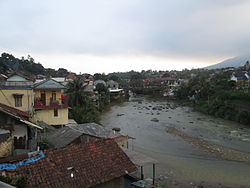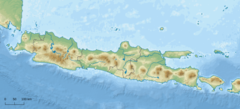| Cisadane River | |
|---|---|
 Cisadane River near Batutulis Train Station | |
| Location | |
| Country | Indonesia |
| Province | West Java Banten |
| Physical characteristics | |
| Source | Mount Pangrango |
| 2nd source | Mount Salak |
| Mouth | |
• location | Java Sea |
• coordinates | 6°00′53″S 106°37′58″E / 6.014785°S 106.632768°E |
| Length | 137.6 km |
| Basin size | 1,366.6 km2 |
| Basin features | |
| Tributaries | |
| • left | Cianten |
The Cisadane River is a 138 kilometres (86 mi) long river in northern West Java, Indonesia.[1] Note that the prefixed syllable "Ci" means river, so to avoid tautology the true translation is "Sadane River". The river has its source at Mount Pangrango and passes through Bogor and Tangerang before flowing to the Java Sea.
The rivers in Banten, the westernmost province of Java, run roughly parallel to each other. The main ones are the Peteh, called the Banten on the lower reaches near the city of Kota Banten, the Ujung, which enters the sea at Pontang, the Durian, which enters the sea at Tanara, the Manceuri, and the Sadane.[2]
The Ci Sadane rises in the mountainous region of Priyangan and 1682 formed the border between the Dutch East India Company (VOC) territory and Batavia (modern Jakarta).[2]
The Durian, Manceuri, and Sadane rivers flow through the Tangerang Plain.[3] In 1911 the colonial government started to prepare an irrigation plan, and in 1914 determined that various tracts in the plain should be subject to compulsory purchase for this purpose. In 1919 a plan was issued where the north of the plain would be irrigated by the Ci Sadane and the southern area by the Ci Durian.[4]
Its tributaries include the Ci Anten and Ci Apus. The river has a watershed area of approximately 1,370 km2.[5]
- ^ McNally, Rand (1993). The New International Atlas.
- ^ a b Talens 1999, p. 40.
- ^ Irrigation Revisited 2015, p. 298.
- ^ Irrigation Revisited 2015, p. 299.
- ^ "Kali Cisadane". Catalogue of Rivers for Southeast Asia and The Pacific - Volume V. International Hydrological Programme. 2004.
